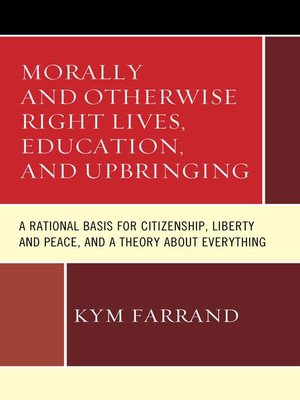Morally and Otherwise Right Lives, Education and Upbringing
ebook ∣ A Rational Basis for Citizenship, Liberty and Peace, and a Theory about Everything
By Kym Farrand

Sign up to save your library
With an OverDrive account, you can save your favorite libraries for at-a-glance information about availability. Find out more about OverDrive accounts.
Find this title in Libby, the library reading app by OverDrive.



Search for a digital library with this title
Title found at these libraries:
| Library Name | Distance |
|---|---|
| Loading... |
Morally and Otherwise Right Lives, Education and Upbringing proposes a new theory concerning values. This is argued to be a rationally-justified, evidence-based theory. It has one universally-applicable general value, under which come many specific values, e.g., non-sexism. The book discusses practical applications of these values to life generally, especially to morality, education and other upbringing. In doing so, and because this education covers all areas, the book also discusses politics, society, law, peace-studies, health-care ethics, economics, philosophy, gender-issues, sexuality, sexism, racism, environmental-issues, animal rights, natural and social science, psychology, religion, art, music, literature, media and much more.
Applications include advocating extensive freedoms and types of democracy, fairness, justice, equality, rights, responsibilities, flourishing, happiness and unselfish universal benevolence. Emotions are argued to be important.
Alternative theories are criticised. They are argued to lack evidence. The book discusses problems with evidence, one conclusion being that the theory needs to be self-critical and sometimes skeptical concerning its details.
Applications include advocating extensive freedoms and types of democracy, fairness, justice, equality, rights, responsibilities, flourishing, happiness and unselfish universal benevolence. Emotions are argued to be important.
Alternative theories are criticised. They are argued to lack evidence. The book discusses problems with evidence, one conclusion being that the theory needs to be self-critical and sometimes skeptical concerning its details.







